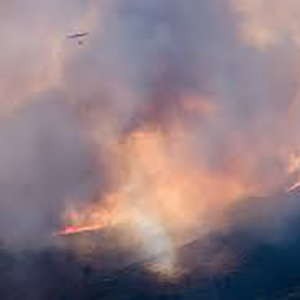
Wildfire Smoke Drives Air Quality into ‘Unhealthy for Sensitive Groups’ Category
For more information, contact Kim Papich, SRHD Public Information Officer (509) 324-1539 or kpapich@srhd.org
SPOKANE, Wash. -- Smoke from wildfires burning to the north is affecting air quality in the Spokane area, prompting officials from Spokane Regional Health District (SRHD) and Spokane Regional Clean Air Agency (Spokane Clean Air) to remind residents to take precautions to protect their health.
As of this morning, the air quality monitors in Spokane are reporting levels of fine particulate matter pollution in the "Unhealthy for Sensitive Groups" or "Orange" category of the Air Quality Index (AQI).
Spokane Clean Air's air quality forecaster says winds from the north and northeast are transporting wildfire smoke to our area from the various regional wildfires. A strong high pressure ridge will remain over the region well into next week, bringing generally light winds and continued high temperatures and abundant smoke-filtered sunshine. Air quality will worsen at night as smoke concentrates in valleys and improve slightly in the afternoon with increased wind speeds and mixing of the atmosphere.
The smoke is likely to remain with us into next week. Clearing the smoke from the region will require a change in the weather pattern with winds from the west or southwest. Such a change is not expected for at least the next several days.
"Depending on the wind and wildfire activity, the Air Quality Index may fluctuate between Moderate (yellow) and Unhealthy for Sensitive Groups (orange) today and Thursday," according to Stephanie May, public information specialist for Spokane Clean Air.
Smoke is a mix of gases and fine particles. Breathing smoke can make anyone sick. Even someone who is healthy can get sick if there is enough smoke in the air.
Breathing in smoke can have immediate health effects, including:
- Coughing
- Trouble breathing normally
- Stinging eyes
- A scratchy throat
- Runny nose
- Irritated sinuses
- Wheezing and shortness of breath
- Chest pain
- Headaches
- An asthma attack
- Tiredness
- Fast heartbeat
It is important individuals limit their exposure to smoke - especially if they are susceptible.
"Smoke from wildfires is especially harmful for those with health conditions like asthma. We recommend that people who are sensitive to poor air quality follow their breathing management plans, keep medications on hand and contact their health provider if necessary," said Dr. Bob Lutz, SRHD health officer.
Children also are more susceptible to smoke because their respiratory systems are still developing. Kids breathe more air (and air pollution) per pound of body weight than adults, and they are more likely to be active outdoors.
Here are some additional steps people can take to protect themselves:
- Pay attention to air quality reports. The Air Quality Index (AQI) uses color-coded categories to report when air quality is good, moderate or unhealthy.
- Use common sense. If it looks and smells smoky outside, it is probably not a good time to go for a jog, mow the lawn or allow children to play outdoors.
- If a person has heart or lung disease, is an older adult, or has children, they should talk with their provider about whether and when they should leave the area. When smoke is heavy for a prolonged period of time, fine particles can build up indoors even though a person may not see them.
- Some room air cleaners can help reduce particulate levels indoors, as long as they are the right type and size for your home.
- Paper "comfort" or "dust masks" are not the answer. The kinds of masks people can commonly buy at the hardware store are designed to trap large particles, such as sawdust. But they generally will not protect lungs from the fine particles in smoke.
- Respiratory masks labeled N95 or N100 provide some protection - they filter out some fine particles but not hazardous gases in smoke (such as carbon monoxide, formaldehyde, and acrolein.) This type of mask can be found at many hardware and home repair stores and pharmacies.
###
Media contacts:
Spokane Regional Clean Air Agency: Stephanie May, (509) 477-4727, ext. 125 SMay@spokanecleanair.org
Spokane Regional Health District: Kim Papich, 509-324-1539; kpapich@srhd.org
Washington State Department of Ecology (for air quality information outside of Spokane County): Brook Beeler, 509-329-3478; bbee461@ecy.wa.gov
More information:
Spokane Current Air Quality webpage Spokane Regional Health District wildfire FAQ
Washington State Department of Health Wildfire Smoke webpage
